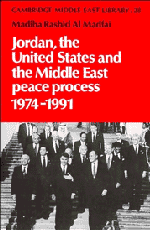Book contents
- Frontmatter
- Contents
- Foreword by William B. Quandt
- Acknowledgements
- Prologue
- 1 Introduction
- 2 Kissinger's legacy and imprint on the Middle East
- Part I Jordan in the Carter Middle East policy
- Part II Jordan in the Reagan Middle East policy
- Part III US, Jordan and Arab approaches to peace
- Appendices
- A Comparison of Middle East peace proposals
- B Jordan–US exchange of questions and answers on the Camp David Accords, September 1978
- C US assistance to Jordan 1975–1989
- D Arab assistance to Jordan paid in accordance with the 1978 Baghdad Summit Conference and 1980 Amman Arab Summit
- E Peres–Hussain Agreement (The London Document), 11 April 1987
- F Shamir's Four-point plan, April 1989
- G Baker's Five-point plan, December 1989
- H Invitation to Madrid Peace Conference, 18 October 1991
- I Letter of Assurances to the Palestinians, 18 October 1991
- Notes
- Select bibliography
- Index
- Cambridge Middle East Library
G - Baker's Five-point plan, December 1989
Published online by Cambridge University Press: 25 February 2010
- Frontmatter
- Contents
- Foreword by William B. Quandt
- Acknowledgements
- Prologue
- 1 Introduction
- 2 Kissinger's legacy and imprint on the Middle East
- Part I Jordan in the Carter Middle East policy
- Part II Jordan in the Reagan Middle East policy
- Part III US, Jordan and Arab approaches to peace
- Appendices
- A Comparison of Middle East peace proposals
- B Jordan–US exchange of questions and answers on the Camp David Accords, September 1978
- C US assistance to Jordan 1975–1989
- D Arab assistance to Jordan paid in accordance with the 1978 Baghdad Summit Conference and 1980 Amman Arab Summit
- E Peres–Hussain Agreement (The London Document), 11 April 1987
- F Shamir's Four-point plan, April 1989
- G Baker's Five-point plan, December 1989
- H Invitation to Madrid Peace Conference, 18 October 1991
- I Letter of Assurances to the Palestinians, 18 October 1991
- Notes
- Select bibliography
- Index
- Cambridge Middle East Library
Summary
Statement Issued by the Department of State, December 6, 1989
The United States understands that because Egypt and Israel have been working hard on the peace process, there is agreement that an Israeli delegation should conduct a dialog with a Palestinian delegation in Cairo.
The United States understands that Egypt cannot substitute itself for the Palestinians and Egypt will consult with Palestinians on all aspects of that dialog. Egypt will also consult with Israel and the United States.
The United States understands that Israel will attend the dialog only after a satisfactory list of Palestinians has been worked out.
The United States understands that the Government of Israel will come to the dialog on the basis of the Israeli Government's May 14 initiative. The United States further understands that Palestinians will come to the dialog prepared to discuss elections and the negotiating process in accordance with Israel's initiative. The United States understands, therefore, that Palestinians would be free to raise issues that relate to their opinions on how to make elections and the negotiating process succeed.
In order to facilitate this process, the United States proposes that the Foreign Ministers of Israel, Egypt, and the United States meet in Washington within 2 weeks.
- Type
- Chapter
- Information
- Publisher: Cambridge University PressPrint publication year: 1993

